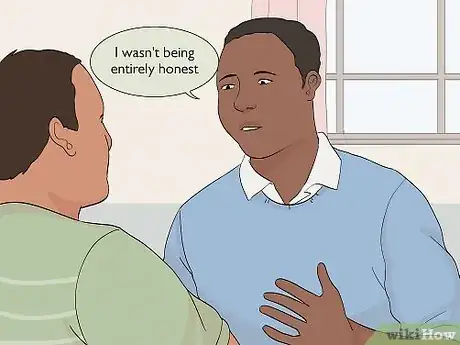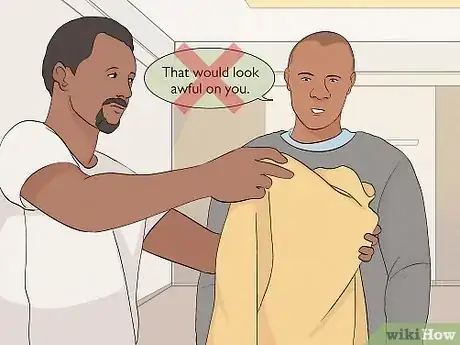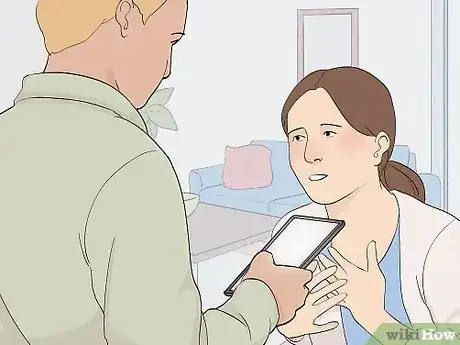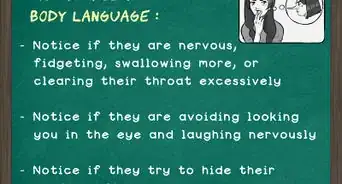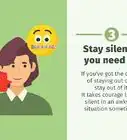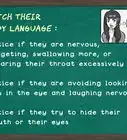This article was co-authored by Amy Wong. Amy Eliza Wong is a Leadership and Transformational Coach and the Founder of Always on Purpose, a private practice for individuals and executives looking for help in increasing personal well-being and success and in transforming work cultures, developing leaders, and improving retention. With over 20 years of experience, Amy coaches one-on-one and conducts workshops and keynotes for businesses, medical practices, non-profits, and universities. Based in the San Francisco Bay Area, Amy is a regular instructor at Stanford Continuing Studies, holds an MA in Transpersonal Psychology from Sofia University, a certification in Transformational Life Coaching from Sofia University, and a certification in Conversational Intelligence from CreatingWE Institute.
wikiHow marks an article as reader-approved once it receives enough positive feedback. In this case, several readers have written to tell us that this article was helpful to them, earning it our reader-approved status.
This article has been viewed 216,782 times.
You have probably told many little lies and half-truths throughout your life. Radical honesty is the practice of minimizing the lies you tell. The "radical honesty" movement was founded by a psychotherapist named Brad Blanton, who claims that effective communication relies on honesty. Radical honesty is a pledge to see and verbally acknowledge things exactly as they are, to the best of your ability. To practice radical honesty, adopt a mindset where you're able to see and acknowledge reality. Learn to communicate what you see effectively. Make sure to approach the situation with kindness. Being radically honest should not hurt other people's feelings.
Steps
Adopting the Right Mindset
-
1Observe yourself lying. Most people lie throughout the day, every day, often during casual conversation.[1] If you try to catch yourself lying, you may be surprised with how often you do it. It can also be enlightening to think about how often the people around you lie. Notice the things you say, and be honest about whether they're accurate.
- People often start with small lies, which grow over time. When people ask you how you're doing, do you respond honestly? Do you bite your tongue? Are you lying by omission? These small lies can often morph into bigger lies to keep up appearances.
- People also may lie to make themselves look better. For example, you may find yourself lying to your doctor about your habits or to your boss about your work ethic. These lies can have big consequences if you keep up with them.
-
2Learn the downsides of lying or sugar-coating. Should you really shelter someone from reality? Think about the consequences of the lies you tell. Each time you tell a white lie, pause and think about how it could harm you or someone else.
- Think about the potential consequences each time you lie. Is anyone getting hurt? Are you potentially hurting yourself? Is this a situation where lying has any benefits?
- For example, maybe your spouse asks for your input about confronting their boss at work. They expect your support, but you think it's a bad idea. Lying to spare your spouse's feelings could have major consequences for their career.
- Lying can also harm your self-esteem because you are not being genuine or true to yourself.
Advertisement -
3Face uncomfortable truths about yourself. Radical honesty is not just about pointing out truths about others. You need to be able to confront uncomfortable truths about yourself. People have a tendency to shy away from truths that are scary. Learn to evaluate yourself more objectively and ask yourself honest questions.[2]
- Make a habit of examining every aspect of your life. Are you being as healthy as you could be? Are your relationships fulfilling? Are you working as hard on your career as you should be?
- If something feels wrong or off, learn to confront it rather than ignore it. If you, for example, feel uncomfortable in a relationship, evaluate why rather than letting things go on longer than necessary.
- Keep in mind that being honest with yourself takes courage and self-awareness. It is important to be honest to keep a balance mentally, physically, and emotionally.
- Don't be afraid to confront reality, because seeing things as they really are isn't a negative thing![3]
-
4Push yourself to think rationally. Try to step back from any given situation and look at it from an outsiders perspective. Part of radical honesty is being able to view things rationally. When you find yourself in a stressful situation, avoid justifying bad situations or behavior. Instead, try to accept situations for what they are. For example, if you've been developing bad eating habits, do not think to yourself, "It's just because I'm stressed. This will change soon." Instead, look at the situation from a more objective perspective. The truth is, you need to take care of yourself regardless of stress in your life.[4]
- Being objective with yourself is part of radical honesty, and it also includes taking responsibility for your actions. For example, if you know that you are eating unhealthy foods, being honest about your eating habits will require that you change them.
- To increase your self-awareness, try periodically thinking about why you're doing what you're doing, and how your actions make you feel.[5]
Communicating Directly
-
1Let people know your intentions. If you're going to practice radical honesty, people deserve a head's up. This is especially true if you're practicing radical honesty with your spouse. Most people in society withhold the truth at least some of the time, so someone being so candid can be shocking. Before giving someone an uncomfortable truth, let them know you're a proponent of radical honesty.[6]
- For example, before sharing your honest opinion with someone, say something like, "So, I practice radical honesty, which means I try to give objective assessments."
- With your spouse, talk over the concept of radical honesty together before you begin practicing it. Talk about why it would help with your marriage and what the two of you can expect.
-
2Confess when you lie. If you find you've told a lie, stop and confess. Lying often comes naturally, especially white lies, so it's easy to be dishonest without realizing it. Lies have a tendency of getting out of control, so it's usually easier to be honest directly after telling a lie. If you caught yourself withholding the truth, stop and say so.
- For example, say something like, "I know I said I thought your proposal was great earlier today, but I actually wasn't being entirely honest because I didn't want to hurt your feelings. I actually have some concerns and wanted to talk them over with you."
- By recognizing that you have a tendency to be less than truthful and deciding to change, you are already moving towards a more positive stage.[7]
-
3Express yourself directly. Once you're used to catching yourself in lies, learn to express yourself directly. In a situation, identify what you're feeling and any needs that result from that feeling. What do you need someone to do? How are a person's actions affecting you? Let someone know these things directly.[8]
- Learn to express frustration to others. For example, "I'm annoyed that you didn't respond to our memo earlier. I need you to be quicker in the future."
- If possible, express your honesty in person. It allows you to fully experience the ramifications of being radically honest, and makes it harder for the receiving party to ignore you.
-
4Communicate with "I"-statements. Any kind of harsh truths can be difficult for a person to hear. To minimize the impact, use "I"-statements. These focus on personal feeling over objective fact. They begin with, "I feel..." followed by immediately stating your feelings. You then explain the actions that led to those feelings and why you feel the way you do.[9]
- For example, say your spouse has a tendency to be on their phone while you two are out together. You have ignored this before, but the tendency really does make you feel ignored. Do not say, "You shouldn't be on your phone all the time when you're out. It's disrespectful."
- Rephrase the above statement using an "I"-statement. For example, "I feel disrespected when you're on the phone all the time when we're out together because it seems like you're not paying attention to me."
-
5Walk away when necessary. Not everyone will accept radical honesty. Some people prefer to deny harsh truths about themselves. When this results in your boundaries being violated, it's okay to walk away. For example, if you've continually explained to a friend their behavior is hurtful and seen no change, it's okay to end this relationship.[10]
Minimizing Hurt Feelings
-
1Handle honesty in return. When you are radically honest, some people will respond in like manner. Welcome it. This is a good opportunity to open new dialogue, and discover things about yourself that you might have otherwise never known. If someone gives you some harsh feedback, respond with gratitude. Say things like:
- "Thanks for telling me."
- "That's fine."
- "That's true!""
-
2Be kind while being honest. How honest is too honest? In the honesty business, there’s a fine line between radical and reckless honesty. Think about how to phrase what you're saying in a way that is not hurtful. Having tact is not the same thing as lying, and some feelings are subjective. You do not, for example, need to tell someone, "That band is bad." You only need to say, "I don't care for their music."
- If someone asks for your opinion, find a way to give that to them in a way that's not overtly mean or comes off as a put-down. For example, a friend asks you what you think of a dress they're trying to purchase. Do not say, "That looks awful on you." Instead, say something like, "That isn't the best style for you."
-
3Make requests and not demands. Remember, your honesty comes from your own perspective. If you need someone to change their behavior, request they do so. Do not try to make demands, as this will not be met well.[11]
- For example, do not say to your spouse, "You need to have your phone off when we're together." Instead say, "I would appreciate it if you could be on your phone less often when we're out."
Expert Q&A
-
QuestionHow can I practice honesty?
 Amy WongAmy Eliza Wong is a Leadership and Transformational Coach and the Founder of Always on Purpose, a private practice for individuals and executives looking for help in increasing personal well-being and success and in transforming work cultures, developing leaders, and improving retention. With over 20 years of experience, Amy coaches one-on-one and conducts workshops and keynotes for businesses, medical practices, non-profits, and universities. Based in the San Francisco Bay Area, Amy is a regular instructor at Stanford Continuing Studies, holds an MA in Transpersonal Psychology from Sofia University, a certification in Transformational Life Coaching from Sofia University, and a certification in Conversational Intelligence from CreatingWE Institute.
Amy WongAmy Eliza Wong is a Leadership and Transformational Coach and the Founder of Always on Purpose, a private practice for individuals and executives looking for help in increasing personal well-being and success and in transforming work cultures, developing leaders, and improving retention. With over 20 years of experience, Amy coaches one-on-one and conducts workshops and keynotes for businesses, medical practices, non-profits, and universities. Based in the San Francisco Bay Area, Amy is a regular instructor at Stanford Continuing Studies, holds an MA in Transpersonal Psychology from Sofia University, a certification in Transformational Life Coaching from Sofia University, and a certification in Conversational Intelligence from CreatingWE Institute.
Leadership & Transformational Coach One way to practice honesty is to start by being honest with yourself. Try to increase your own self-awareness of your emotions and thoughts at any given moment. Are there things you are avoiding examining about why you feel negatively towards certain situations or people? This can be the first step to learning to be more honest in the world at large.
One way to practice honesty is to start by being honest with yourself. Try to increase your own self-awareness of your emotions and thoughts at any given moment. Are there things you are avoiding examining about why you feel negatively towards certain situations or people? This can be the first step to learning to be more honest in the world at large.
Warning
- Be careful. Honesty can be hurtful. Don't ask questions you may not want answers to.
- Be aware of cultural differences. Please be aware of the culture you are being honest in. In the western world, most cultures are more 'radically honest' than the Middle East, Africa, and Asia. Being radically honest can come across as being rude or insensitive to their way of relating to one another.
References
- ↑ http://www.eurekalert.org/pub_releases/2002-06/uoma-urf061002.php
- ↑ http://www.huffingtonpost.ca/kaitlyn-kochany/relationship-tools_b_4739216.html
- ↑ Amy Wong. Leadership & Transformational Coach. Expert Interview. 30 April 2020.
- ↑ http://www.huffingtonpost.ca/kaitlyn-kochany/relationship-tools_b_4739216.html
- ↑ Amy Wong. Leadership & Transformational Coach. Expert Interview. 30 April 2020.
- ↑ https://www.littlegaybook.com/how-practice-radical-honesty/
- ↑ Amy Wong. Leadership & Transformational Coach. Expert Interview. 30 April 2020.
- ↑ http://www.finerminds.com/love-relationships/tell-truth-without-being-jerk
- ↑ https://www.littlegaybook.com/how-practice-radical-honesty/
About This Article
If you want to try out radical honesty, which is the practice of of minimizing the lies you tell in every day life, let people know you’re doing it so they're not shocked or offended. Then, whenever you realize you’ve told a lie, confess to the person, which helps prevent the lie getting out of control in the future. Also, try to be completely honest about your feelings and needs to make things clear for others. For example, you might say something like: “I was a little annoyed that you didn’t respond to our memo earlier. I’d appreciate if you could be quicker in the future.” For more tips from our Counselor co-author, including how to be as kind as possible while being honest, read on!






